Reality Check: Legal advice on the Brexit deal
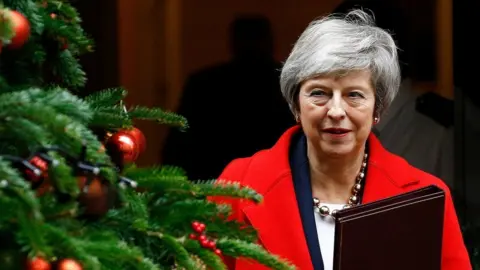 Reuters
ReutersThe government has been forced to publish the legal advice given to Prime Minister Theresa May by the Attorney General Geoffrey Cox on the proposed backstop plan, which aims to avoid a hard border in Ireland under all circumstances.
The backstop, or guarantee, appears in a "Protocol on Ireland/Northern Ireland", which forms part of the UK's Withdrawal Agreement with the EU.
It would only come into effect if a UK-EU trade agreement keeping the border open is not ready by the end of a post-Brexit transition period.
Much of the advice given by the attorney general is not new, but it is set out in black and white for the first time.
Here are some excerpts from the six-page document.
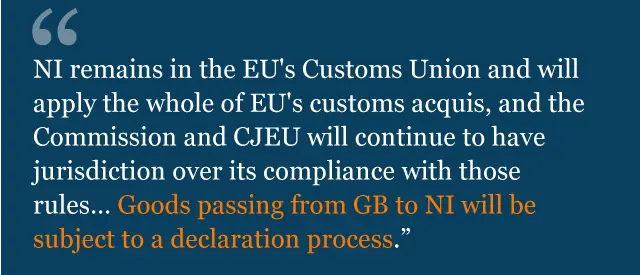
This is a reminder that Northern Ireland would be more deeply entwined in the EU's customs rules and procedures than the rest of the UK.
Northern Ireland would retain full membership of the EU customs union, while Great Britain would be in a separate customs union with the EU.
The outcome of this complex arrangement is that the whole of the United Kingdom would be in a single customs territory with the EU.
That means there would be no tariffs on goods passing between anywhere in the UK and the EU, but declarations would have to be made (not involving any kind of border checks) for goods passing from Great Britain to Northern Ireland.
It is a carefully crafted fudge, in other words, with which no-one is entirely happy.
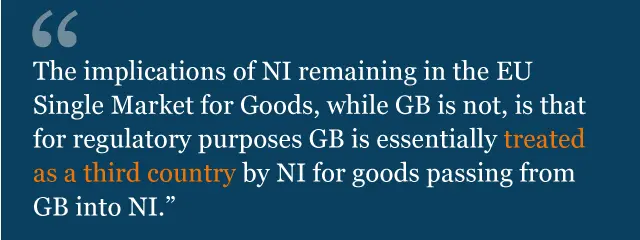
This section spells out clearly the implications of Northern Ireland remaining in the EU's single market for goods while the rest of the UK does not.
Again, there are no surprises here, but the attorney general emphasises that, for regulatory purposes, Great Britain would be treated as a third (or separate) country by Northern Ireland.
That means that for goods crossing the Irish Sea to Northern Ireland (but not in the other direction) regulatory checks would have to take place.
The EU has conceded that many of them (on things like product standards) could take place online or away from ports or airports.
But that is not the case for checks on food and animal produce. There are already checks on live animals arriving in Northern Ireland from Great Britain, but this would be a much broader system of controls.
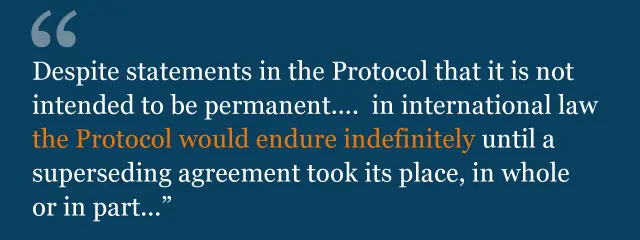
This point is already clear in the text of the Withdrawal Agreement, but the attorney general is giving a legal opinion about international law: everyone says the backstop is intended to be temporary, but it could - in theory - remain in place indefinitely "unless or until" another permanent agreement takes its place.
This is only one of several ways in which many supporters of Brexit fear a trap, although it is quite clear that the EU is equally uncomfortable with many aspects of the backstop.
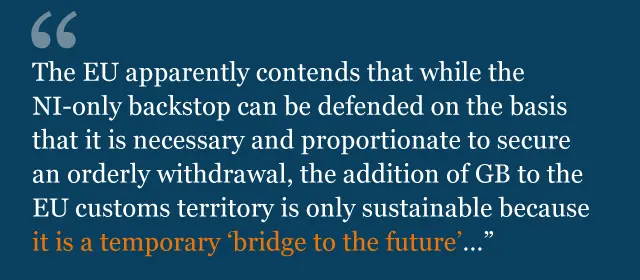
The attorney general sets out at some length why the EU does not like the backstop either.
It raises awkward legal questions about the UK (a country that will no longer be part of the EU) being responsible for protecting one of the borders of the EU single market.
It could also, he suggests, provoke complaints (legal or otherwise) from Irish companies, which might argue that the EU is giving rival companies in Northern Ireland the competitive advantage of full access to both the EU and UK markets.
And it complicates the EU's ability to strike future trade deals around the world, because the EU would not be able to define the extent of its customs territory precisely.
It is likely to be important for the EU, the attorney general says, that the backstop can be presented as "a temporary arrangement with a clear and early end".
![Text from legal advice saying: [The EU could] submit a formal notification to the Joint Committee arguing that the Protocol was no longer necessary in part and that the GB elements of the customs union should fall away, leaving only NI in the EU customs territory…](https://ichef.bbci.co.uk/news/480/cpsprodpb/15E2B/production/_104634698_legal5-nc.png.webp)
As if there was not already enough concern being expressed about the backstop and the lack of a UK right to leave it unilaterally, this will add fuel to the fire.
It suggests that the language used in the protocol to the Withdrawal Agreement might allow the EU to suggest that the UK-wide part of the backstop should be abandoned, while keeping Northern Ireland closely tied to the EU.
But the lack of a unilateral exit clause cuts both ways. If the UK cannot bring the backstop to an end without the EU's approval, then similarly the UK would have to agree to the EU ending it.
It has been designed deliberately to concentrate minds on a permanent alternative solution.
![Text from legal advice saying: [The Protocol] "does not provide for a mechanism that is likely to enable the UK lawfully to exit the UK wide customs union without a subsequent agreement. This remains the case even if parties are still negotiating many years later, and even if the parties believe that talks have clearly broken down and there is no prospect of a future agreement."](https://ichef.bbci.co.uk/news/480/cpsprodpb/1853B/production/_104634699_legal6-nc.png.webp)
In the end, as the attorney general points out, this is a highly political construction.
But the prospect of the UK being unable to leave a temporary customs union without a subsequent agreement on the Irish border makes many people extremely uncomfortable.
This gets to the heart of the problem. The EU believes the only way for the Irish border to remain as open as it is now is for either Northern Ireland or the whole of the UK to stay in the customs union and the single market. And it says it is still waiting for the UK to come up with a credible alternative plan.


